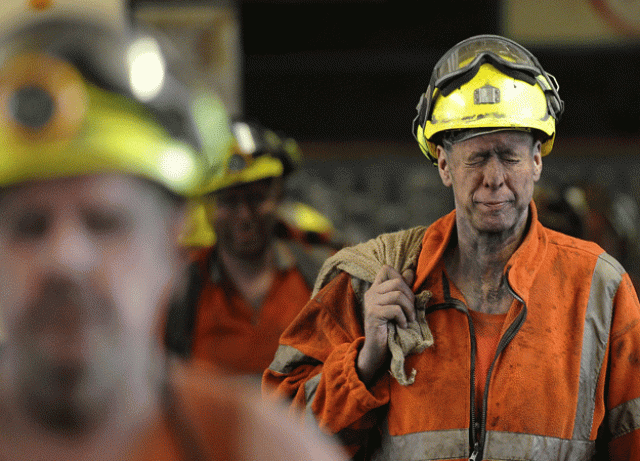Emotions run high as UK's last deep coal mine closes
The shutdown of the mine in Yorkshire in northern England closes a 200-year chapter of Britain's industrial history

Coal miners finish the final shift before closure at the Kellingley Colliery in Yorkshire, northern England, on December 18, 2015. PHOTO: AFP
Emotional workers in dusty orange overalls and hard hats were cranked hundreds of metres to the surface of the Kellingley Colliery in Yorkshire for the last time, some of them embracing and others shaking hands.
"I never thought I'd see this day come but it has, and times move on, and we have to now, and that's that," said Stephen Walker, 50, who has worked at the mine since 1988.
"We've lost an entire industry, we've lost a way of life. Communities have been devastated over the last 30 years and haven't recovered."
Kellingley once employed around 2,000 people but this had dwindled to 450 by its final days, as Britain increasingly imported cheaper coal from countries like Russia and Colombia.
Coal demand slowly burning out, except in India, SE Asia: IEA
 PHOTO: AFP
PHOTO: AFPKnown as the dirtiest fossil fuel, coal has fallen out of favour as world governments look to limit emissions and switch to clean energy.
"I feel gutted, like everybody else," another miner, Tony Carter, 52, said in the day before the closure.
"It's the end of an era. This week we're history -- the last deep mine in England. Our country was built on coal -- the Industrial Revolution," he said.
The British government plans to phase out the most polluting coal power stations by 2025, signalling the end for an industry that fuelled the British Empire and industrial growth.
"The closure of Kellingley Colliery marks the end of an incredibly significant period in our country's social and economic history," said Philip Lawrence, chief executive of the British Coal Authority.
On brink of climate deal, nations set turning point from fossil fuels
 PHOTO: AFP
PHOTO: AFPThe industry is remembered for the bitter 1980s struggle by miners to stop the Conservative government of Margaret Thatcher shutting their workplaces -- a deeply symbolic defeat for the unions that helped usher in the liberal British economy of today.
Like many post-industrial areas of Britain, former coal-mining regions have often struggled to adjust to Britain's new service-driven economy, leading to chronic unemployment.
Unions and local politicians had fought for two years to stop the closure, which will end a vital source of income in the area around the nearby village of Knottingley leaving many families questioning their future.
Some of the mine's employees, who will receive severance packages of 12 weeks of wages, began there at 15 and fear they may struggle to find other work.
"Some of the miners have already found alternative employment, some of the miners are going to retire, some of the miners are looking for jobs," coal mine manager Shaun McLoughlin said.
Beijing lifts smog red alert
 PHOTO: AFP
PHOTO: AFP"It's very sad but it's the economic truth of it."
The area is surrounded by three coal-fired stations including Drax, which produces between seven and eight per cent of Britain's electricity -- but only Drax is set to remain operational after 2016.
Earlier this month, 195 nations sealed a landmark deal to curb greenhouse emissions and limit climate change at a United Nations conference in Paris.
Global coal consumption has declined for the first time in this century thanks largely to China's economic restructuring, but usage continues to grow in India and Southeast Asia, the IEA said Friday.
The Paris-based International Energy Agency said in a report issued in Singapore that growth in world coal demand halted in 2014 for the first time since the 1990s.
China accounts for half of global coal usage.
Global coal demand fell 0.9 per cent from 7,991 million tonnes in 2013 to 7,920 million tonnes in 2014, the IEA said.



















COMMENTS
Comments are moderated and generally will be posted if they are on-topic and not abusive.
For more information, please see our Comments FAQ